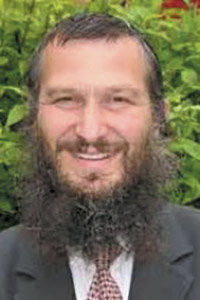
Editor’s note: Puah will hold a Shabbat to share details of their mission to help Jewish couples address a wide variety of fertility issues. The Shabbaton will be at Congregations Ahavat Shalom (the the Teaneck ‘Apartments’ minyan), Bnai Yeshurun and Keter Torah on October 16 and 17.
How was Puah Founded?
On July 25, 1978 the world of fertility changed when Louise Joy Brown was born. Brown was the first baby born as a result of In Vitro Fertilization, and is known as the world’s first “test tube baby”. The new advances in medicine and science were initially met with concern by many leading Poskim. Despite this, The Chief Rabbi of Israel at that time, Rabbi Mordechai Eliyahu z”l, fought against this trend. Philosophically, Rav Eliyahu believed that if Hashem made this kind of technology possible, there surely must be a way to use it in a positive way that is Halachically acceptable. Rabbi Eliyahu reached out to a close Talmid of his, prolific author and leading rabbinic scholar, Rabbi Menachem Burstein to research and propose a halachic solution to the concerns raised by IVF. That is how Puah was born and today, Puah has a global headquarters building in Jerusalem as well as a Northern American branch based in New York. In 1990, with no more than a desk in Rabbi Burstein’s living room in Jerusalem, Puah began to help couples on their journey to have children. Puah is the pioneer of halachic supervision in laboratories, being the first organization to develop and implement such a process. Supervision is done to make sure there are never mistakes of human error that take place that would have tragic halachic and emotional consequences.
When does a couple go from “We are trying to have a baby” to “We have a problem”?
Generally, the fertility organizations estimate that after a year of trying to conceive without success, a couple should seek the advice of a fertility specialist. That being said, all couples are different. Some couples might be older and they don’t want to wait a year, others may have a known, pre existing condition. For example, just this morning, I met with a couple that the husband had undergone radiation treatment for Hodgkin’s disease when he was 12 years old, based on that medical background, they did not wait a whole year.
At Puah we analyze each specific situation with a full medical history and whatever else may be relevant to provide completely customized and specific counseling for each couple. Sometimes the answer is a simple, “You are fine, keep trying.” For other couples, we may recommend to start non-invasive testing while in others still the situation may warrant commencing treatment immediately.
This is obviously a very trying time for the couples, how do you help calm them?
We live in a very child-centric culture. The Torah is passed on from generation to generation and so much of what goes on in our communities is for kids or about kids. In addition, in today’s fast-paced world, people increasingly expect instant gratification in everything they do in life. Consequentially, couples start to get worried right away if they are not getting pregnant. In fact, the reality is that 1 in 6 couples have fertility challenges! The vast majority of these couple will go on to conceive and have children with the help of assisted reproductive technologies, such as IVF. Our very first step is to normalize the couple’s experience; we help them understand how common, how normal and thankfully how treatable their situation is. Equally as important, we make ourselves available to our couples—free of charge– 24 hours a day, 6 days a week, for anything at all that is on their mind. Many people, especially initially, do not feel comfortable sharing their predicament with their family, friends or personal rabbi; we at Puah are here for them, we are here to listen, to provide counsel, advice and chizuk and help guide the couple through their journey.
In general, “knowledge is power.” Would this be correct here too?
Yes, it would, but the correct knowledge is very important. Far too often, a couple comes to us saying that their friend or relative told them such-and-such, or that they read something online. Incorrect knowledge can be harmful. Puah excels by giving correct and specific information to each individual couple
Do you really get 400 calls each day?
Absolutely, if not more! Our team of more than a dozen counselors get calls from all over the world; from India, China, South Africa, Europe, England, North America, South America: wherever there are Jews. In the past 25 years, Puah has helped over 60,000 couples worldwide.
How do you deal with servicing such a diverse group of people? I am sure that the advice for the couple in Beijing is not the same as the advice for the couple in Woodmere.
We definitely take absolutely everything into consideration. We get to know the couple, who their Rav is, their background, their level of practice -and we don’t come with an agenda. This sets us apart from others; a Sefardi couple will get a different psak from an Ashkenazi couple. This is because we have spent lots of time speaking with all the leading poskim and gedolei Yisroel, from Rav Ovadia zt”l to Rav Eliyashiv zt”l. Each couple receives a customized psak which is specifically suitable and appropriate for them. Our halachic and medical advice is customized to each and every couple and their situation.










